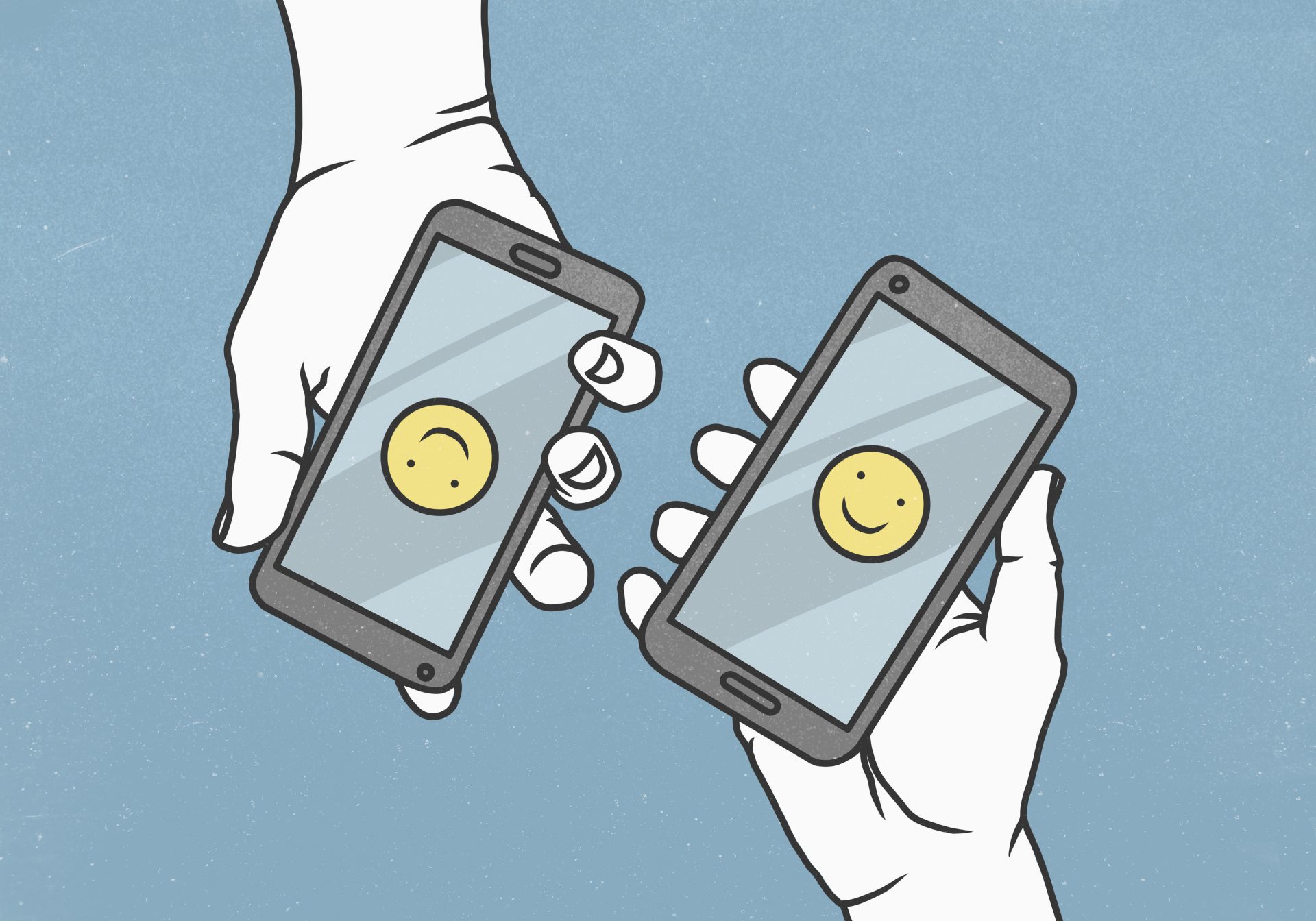The real reason you can’t stop tagging everyone in memes right now
Written by Kayleigh Dray
Kayleigh Dray is Stylist’s digital editor-at-large. Her specialist topics include comic books, films, TV and feminism. On a weekend, you can usually find her drinking copious amounts of tea and playing boardgames with her friends.
Psychology experts have revealed what your newfound love of memes (thanks again, lockdown!) actually says about you.
Once upon a time, I spent ages poring over my friends’ photos on social media after a night out, occasionally sending them messages demanding they delete the one of my ‘bad side’ (vanity, thy name is Kayleigh).
Nowadays, though, I’m not in any of my friends’ photos, because nights out are a thing of the past. So are days out, actually. All the brunches, pub lunches, shopping days, museum visits, cinema dates, late-night dinners, and theatre trips that used to fill my diary up to absolute bursting point are gone.
Instead, we have this never-ending lockdown. And, thanks to the Covid-19 pandemic, my friends and family have been reduced to just so many pixels on Zoom.

Still, though, my phone keeps pinging like mad with notifications – so much so that I’ve had to turn it off (the constant buzzing proved ever so distracting during the morning meeting).
Why? Because I keep being tagged in meme after meme after glorious smirk-inducing meme.
And do you know what? I spend a pretty big chunk of my own day scrolling through meme pages and pausing to @ people in the comments section, too. Sometimes, I even go one step further and screengrab the aforementioned meme, before pinging it to whoever the lucky recipient is via WhatsApp. Which leads to…
Well, it leads to a string of laugh-face emojis and a conversation about nothing, to be honest. But I love it, all the same. I love being tagged, and I love to tag, and I’m obsessed with memes, and how on earth has this happened?
Keen to learn more, I reached out psychotherapist Ruairi Stewart (aka The Happy Whole Coach) and psychologist Dr Kalanit Ben-Ari (founder of Get The Village) for answers.
And, as ever, the conversation proved to be incredibly illuminating.
Why are we tagging each other in memes so much right now?
“People are trying to stay connected as much as possible right now and sharing memes is a quick and sweet way to maintain relationships and friendships that are meaningful to them,” says Stewart.
“Tagging someone is a way to share something with them that allows you both to feel connected and bonded, to let the other person know you are still actively thinking about them.”
Reminding me that we are spending more time on social media during lockdown in the absence of face-to-face connections, Dr Ben-Ari adds that tagging one another in memes can be an effective way to communicate to the other person that we are thinking of them, and that we want to share something that made us laugh, or touched, inspired or supported us.
“It initiates conversation or contact,” she says simply. “We have a human need to share our experiences so this is an outlet for it.”
What does it mean to tag (and be tagged) in memes, really?
“A funny meme can lift your mood and can also give you emotional support if you’ve been going through a tough time,” says Stewart.
“Memes have a great way of capturing feelings or experiences that we can all relate to and enjoy, so when someone @s you it’s nice to know you’ve been thought of in that moment and the person wanted to share this with you.!
And, as Dr Ben-Ari adds, “it says ‘this person saw something, thought of me and wanted to do something about it’.
“This is comforting and it can even reduce feelings of loneliness to know that someone is thinking of you,” she says.

Life is busy – are memes an effective and time-efficient way of staying in touch?
“Sharing memes with people we get on with is one way of reminding them that we are thinking about them without needing to communicate it on a deeper level,” says Stewart.
“It can be light hearted but make a world of difference to someone who has been feeling isolated or cut off due to the lockdown. And it also serves as a reminder to people that they will have friendships to return to when things get back to normal.”
“However, memes shouldn’t be relied on solely,” cautions Dr Ben-Ari. “It needs to be balanced with a phone or FaceTime conversation and face-to-face connection, where lockdown restrictions allow.
“A meaningful relationship or friendship means sharing your feelings and thoughts with your own words, to process experiences and ideas and to feel a sense of connection. This cannot be achieved by sharing memes alone, but it is a good addition and complements other forms of connection.”
Dr Ben-Ari continues: “Tagging someone in memes lacks a sense of that person’s energy, the non-symbolic connection and the humanity that we have when we see people face to face. There is a different flow, different qualities, and so different conversations can start…
“Fundamentally, we are wired for connection as human beings – physically and emotionally – both of which are stronger face to face. This has been the case since we were babies because our survival was dependent on it.”
How, then, can we improve the quality of our meme-based communication?
“You can add a personal message to say why you sent it to them,” suggests Dr Ben-Ari. “Perhaps it reminds you of a special memory or that you were thinking of them.
“You could even send it on Instagram/WhatsApp along with a voice note which is more personal, letting them know they were in your thoughts. You could ask them their thoughts on it and tell them you hope it made them laugh as hard as it did for you.”
Stewart adds: “Memes can be diverse and used in loads of different ways, but the main takeaway is that it helps us to feel connected and thought of in the moment. Try to think about what would feel good for you as a point of contact from one of your friends; would you prefer if they @ you in a video or would you appreciate a message from them as well?
“Do both and see how your friend responds.”
And, finally, how has the internet transformed friendships and relationships?
“Unfortunately, our vocabulary has become minimised to emojis, which can leave people feeling lonelier with their experiences,” says Dr Ben-Ari. “There are fewer conversations and fewer opportunities to process events, which can affect the quality of relationships.
“One person might send memes and feel that this makes them feel close to their friend, whereas their friend might perceive this as superficial and long for a more meaningful connection.”
Dr Ben-Ari continues: “When having conversations via the internet, we are missing out on the experiences we have in face-to-face communication. When talking in person, our brain analyses things beyond our awareness, such as emotions and facial expressions, which helps with our empathy, sense of safety and sense of connection.
“A hug for example, as well as many other non-symbolic connections, will have a much deeper effect on the brain, body and mind than ever words could.”
Stewart adds: “The internet means that you can connect with someone in an instant. You can also get left on read, which can feel a bit overwhelming and isolating at times. How the internet is used can impact people on so many levels, especially if you feel people aren’t reciprocating or interacting with you despite your efforts to reach out to them.
“Now more than ever, people are using their phones and devices to feel connected, to buffer feelings of overwhelm and isolation. In this way, social media can be a powerful tool but it can be a double-edged sword depending on how someone chooses to use it.”
It’s not all negative, though, as Stewart finishes: “On the plus side, you can message anyone at any time, you can jump on a video call with a friend who can be on the other side of the globe to check in with them if you miss them or you’re worrying about them.
“The internet gives you the ability to share and stay connected when there is a physical distance or restrictions in place. Which makes it all the less surprising that people are turning to memes during lockdown!”
Images: Getty
Source: Read Full Article
